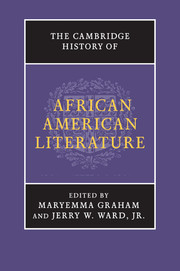Book contents
- Frontmatter
- Introduction
- PART I AFRICAN AMERICAN LITERATURE FROM ITS ORIGINS TO THE TWENTIETH CENTURY
- PART II AFRICAN AMERICAN LITERATURE IN THE TWENTIETH CENTURY
- 12 Foundations of African American modernism, 1910–1950
- 13 The New Negro Movement and the politics of art
- 14 African American literature and the Great Depression
- 15 Weaving jagged words: the black Left, 1930s–1940s
- 16 Writing the American story, 1945–1952
- 17 Geographies of the modern: writing beyond borders and boundaries
- 18 African American literature by writers of Caribbean descent
- 19 Reform and revolution, 1965–1976: the Black Aesthetic at work
- 20 History as fact and fiction
- 21 Redefining the art of poetry
- 22 Cultural resistance and avant-garde aesthetics: African American poetry from 1970 to the present
- 23 New frontiers, cross-currents and convergences: emerging cultural paradigms
- PART III AFRICAN AMERICAN LITERATURE AS ACADEMIC AND CULTURAL CAPITAL
- Bibliography
- Index
- References
23 - New frontiers, cross-currents and convergences: emerging cultural paradigms
from PART II - AFRICAN AMERICAN LITERATURE IN THE TWENTIETH CENTURY
Published online by Cambridge University Press: 28 May 2011
- Frontmatter
- Introduction
- PART I AFRICAN AMERICAN LITERATURE FROM ITS ORIGINS TO THE TWENTIETH CENTURY
- PART II AFRICAN AMERICAN LITERATURE IN THE TWENTIETH CENTURY
- 12 Foundations of African American modernism, 1910–1950
- 13 The New Negro Movement and the politics of art
- 14 African American literature and the Great Depression
- 15 Weaving jagged words: the black Left, 1930s–1940s
- 16 Writing the American story, 1945–1952
- 17 Geographies of the modern: writing beyond borders and boundaries
- 18 African American literature by writers of Caribbean descent
- 19 Reform and revolution, 1965–1976: the Black Aesthetic at work
- 20 History as fact and fiction
- 21 Redefining the art of poetry
- 22 Cultural resistance and avant-garde aesthetics: African American poetry from 1970 to the present
- 23 New frontiers, cross-currents and convergences: emerging cultural paradigms
- PART III AFRICAN AMERICAN LITERATURE AS ACADEMIC AND CULTURAL CAPITAL
- Bibliography
- Index
- References
Summary
The 1970s saw a veritable explosion of black literature, the ground for which had been prepared by the Civil Rights and Black Power movements in the political sphere and the Black Arts Movement in the cultural arena. The Civil Rights Movement brought about legislative changes that granted African American people political enfranchisement; however, it would be some time before these changes would be effected in practice, and their realization, even in the new millennium, remains far from complete. The end of de jure racial segregation opened up economic access and social mobility for certain segments of the African American population but also threatened close-knit black communities that had developed in response to a long history of exclusion and separation. In the realm of literature, this sense of communal dispersal was initially manifested as a revaluation of the political and aesthetic agenda of black cultural nationalism. To be sure, the Black Arts Movement (BAM) of the 1960s launched a cultural redefinition of blackness that was in part responsible for the literary innovations of postmodern African American authors. Yet these authors also chafed against Black Arts ideals of racial identity and community. In fact, literary and cultural critics broadly agree that postmodernism in the African American context is defined by a heightened attention to the intraracial differences (of class, gender, and sexuality) that had been suppressed in black cultural nationalist discourse.
- Type
- Chapter
- Information
- The Cambridge History of African American Literature , pp. 566 - 618Publisher: Cambridge University PressPrint publication year: 2011



